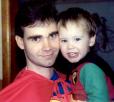|
Blank Space By Roger Dean Kiser, Sr. "Boys, this is your new home now. This is where you will live from now on," said the tall, black haired woman who was standing in front of us kids at the orphanage home. "Will this be our home for ever and ever?" asked one of the orphan boys. "This will be your home until you grow up and go out onto your own," she replied. "I didn't even get to tell my mommy good-bye," said the little boy, as he slowly bowed his head and he began to cry. "Don't nobody love us, no way. We won't never have the good feelin', ever again." I said out loud. "You shouldn't talk like that, Roger. You're just a little boy," said the woman. "But that's the truth, ain't it? Don't nobody love us kids. We won't never be able to have a mommy and daddy ever any more. Will we?" I questioned her. The room fell totally silent as we orphans looked up, waiting for her to answer. But she never did answer. She just looked away and she said not another word. I was six years old when I was told that I would never again have a mother or a father to love me. I'm not even sure that hearing those words from her made any difference to me. But I do know this: I knew right then and there that there would never be another hug, or a kiss for me. I knew right then and there that there would never be a piggyback ride or anyone to ever be proud of me. As I sit her fifty years later I try, as best I can, to remember exactly what it was that I felt at that very moment. But for the life of me; I draw nothing but a total blank. A total blank must have been what I felt at the moment that she spoke those words to us orphans. A blank space is all that I was given to build a life upon. For years I went to various reform schools, jails and then on to prison in 1965. I walked out of prison on February 6th, 1969. That was the first day of my life that I was ever free of the system. I had no where to go and I had no where to turn. All I had was a baggy old suit, that the prison had given me, fifty-five dollars and that blank space I had been given as a child. I was sent back to Alaska where it was fifty-five below zero when I arrived. I lived for several days in a game-room, sleeping behind the pin ball machines. Within a week I was broke and I had nothing to eat. I asked the state of Alaska for help but no one would help me. I begged for food from the army soldiers who would come to town on leave. Finally I left Alaska two weeks later with twenty dollars a man had given me. I did as best I could to build a life with whatever I had left. Which of course was that blank space that the orphanage had given me. Over the next thirty years I was married and divorced six times, and I had 4 children. I could never understand why the marriages would not work. I was kind. I was hard working and I was faithful. Now as I look back I can see that all I really had to share with them was that blank space that I carried inside myself. I don't suppose that they will ever understand that I really did give, and share with them all that I ever truly owned. My "blank space." Many people have asked me what it takes to be a writer. I always tell them that what is most helpful to me is that I always start with a blank page. Roger Dean Kiser, Sr. trampolineone@earthlink.net
Write Roger and let him know your thoughts on his story! Roger Dean Kiser lives in Brunswick, Georgia with his wife Judy. Roger is the author of "Orphan, a true story of Abandonment, Abuse and Redemption", and his newest book Runaway: Life on the Streets--"The Lessons Learned". Autographed copies of his new book can be ordered at: http://www.geocities.com/trampolineone/survive/srv080.htm You can also order his new book through Amazon.com at: http://www.amazon.com/Runaway-Life-Streets-Lessons-Learned/dp/1434335666/ref=sr_1_1/104-9646185-7275131?ie=UTF8&s=books&qid=1189544445&sr=8-1 Read more of his writing at his web site: http://www.rogerdeankiser.com ______________________________________ Creation Q & A Q: Did Darwin degrade women?
A: According to Charles Darwin, the central mechanism of evolution is survival of the fittest. In this concept, inferior animals are more likely to become extinct while the superior ones are more likely to thrive. The racism that this idea has produced has now been both well-documented and widely publicized. Less widely known is the fact that many evolutionists, including Darwin, taught that women were both biologically and intellectually inferior to men. According to Darwinian theory, women were less evolved than men, and
because of their smaller brains, they were "eternally primitive," childlike, less spiritual, more materialistic, and "a real danger to contemporary civilization." The supposed intelligence gap that many leading Darwinists believed existed between human males and females was so large that some leading Darwinists classified them as two distinct speciesmales as Homo frontalis and females as Homo parietalis. The differences were so great that Darwin was amazed "such different beings belong to the same species." Reasons for male superiority included the conclusion that war and
hunting pruned the weaker men, allowing only the most fit to return home and reproduce. Women, in contrast, were not subject to these selection pressures but were protected by men, allowing the weak to survive. Many Darwin biographers, including Peter Brent and Evelleen Richards,
conclude that Darwin had a low opinion of women. Brent concluded, "It would be hard to conceive of a more self-indulgent, almost contemptuous, view of the subservience of women to men" than Darwin's attitude. To find out more, see Darwin Taught Male Superiority at: http://www.answersingenesis.org/articles/am/v2/n1/darwin-taught-male-superiority Source: AnswersInGenesis.org
Click on the Bible above or visit the web site listed below! ___________________________________________
___________________________________________
|
 |
|
Touching Lives - One E-mail at a Time! Author Michael T. Powers - HeartTouchers @ aol.com
|
































